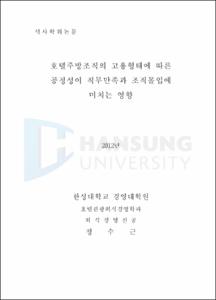미래형 자동차 부품 산업에서의 창업생태계 활성화를 위한 주요 요인 연구
= A study on major factors for vitalizing the startup ecosystem in the future automobile industry
- Type
- Thesis
- Alternative Title
- 델파이와 AHP기법의 적용
- Advisor
- 이석기
- Department
- 대학원 스마트융합컨설팅학과
- Issued Date
- 2022
- Publisher
- 한성대학교 대학원
- Appears in Collections:
- 호텔관광외식경영학과 > 1. Thesis
- Files in This Item:
-
-
Download
 000001215521.pdf
기타 데이터 / 616.13 kB / Adobe PDF
000001215521.pdf
기타 데이터 / 616.13 kB / Adobe PDF
-
Items in Repository are protected by copyright, with all rights reserved, unless otherwise indicated.